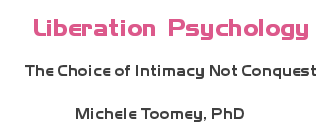Our Complicity in Linking Masculinity to Violence
© 1999 Michele Toomey, PhD
Note: This article first appeared in "Independent School," fall, 1999.
Masculinity based on violence is a tradition that is exploding in our faces. Traditionally, proof of manhood can be established either by taking abuse without flinching or by displaying macho bravado by threatening to inflict abuse or actually doing it. Today's version of masculinity and violence has several new twists. Verbal abuse is flagrant and promoted, killing has replaced attacking, and the bullied are no longer willing to earn their stripes by enduring. They are striking back with deadly vengeance.
We, you the parents and we the educators, are among those being blamed for this horrific turn of events. Together we are seen as members of the two major institutions, schools and families, responsible for educating and protecting our children. The current prevalence of violence in the schools has cast the shadow of blame on us. We are, whether we like it or not, being confronted by public opinion and asked to be accountable for our failure to prevent or stop this trend. It is only right that we stand up, take stock, take a position, and take the lead in helping to bring about a redirection of youthful male energy and anger. Their search for meaning and belonging must be redirected toward intimacy and fairness coupled with caring and respect, and away from alienation and hostility that spills over into violence and rage.
Public schools may be bearing the brunt of the criticism at present, but without intervention, the less dramatic but still abusive rumblings that bubble beneath the surface of our homes and schools will eventually boil over into more violent expressions. What then, can we do to take the lead in changing this frightening trend? As someone who has been trying to address this issue in private schools for over 10 years with marked success, I have an approach and a plan that I invite you to consider and then, hopefully, to implement.
First, to stand up and take stock, we must assess our own biases regarding proof of masculinity through violence. If we already encourage our sons and male students to reveal their feelings of fear, worry, hurt or vulnerability without giving them the "stiff upper lip" pep talk because we fear they will become wimps or sissies, we have passed the level one "macho detection test". If we are caught in our own fear that they will lose their masculinity, we need to look at why we are fearful of male vulnerability and determine if we want to learn how to reconcile strength with vulnerability and masculinity. If we are willing to assess our biases, then we can proceed in good faith and become part of the solution. If we are not willing, and are stuck in the bravado mode, we are, unfortunately, part of today's problem and, as such, are partly to blame for the climate of violence that prevails. We have failed level one of the macho detection test and cannot proceed because we have the wrong orientation to masculinity and power.
The next step is to take a position. Protection from masculinity linked to violence, is masculinity linked to the courage of accountability and fairness. It takes courage to confront others and exact accountability, because it means revealing that we are being negatively affected by something someone else said or did. Once we reveal we are affected, we are in a vulnerable position because the information can be used against us. We have shown a potential "enemy" how they can "get us". However, accountability, if valued, is a wonderful vehicle for fairness, and fairness does not make enemies and is never a breeding ground for violence. Rather, it yields a sense of safety and allows for understanding to occur, which, in turn, leads to connectedness, to intimacy, that never fosters alienation and anger. Instead, it provides a safe place and safe way to express and experience fear, hurt, disappointment, or anger without abuse that leads to violence.
If we accept this position that confrontation with accountability is a protection against violating anger, then in taking the lead we must commit ourselves to learning the skills of confrontation and accountability. A confrontation is not an attack or an accusation, it is a revealing of how something that has been said or done has affected us, and an exacting of others that they claim what was going on for them when they spoke or acted in a particular way. The purpose of the confrontation is to gain insight and greater understanding and then resolve the issue fairly, not to establish blame or punish. In the course of the exchange, the revealing will add a deeper level of understanding of each other. The resolution that evolves should be fair to all and no one should feel defeated or diminished.
To take the lead, we must learn how to confront and be accountable, how to model it and demand it of all our children and our students. Schools must look to their role in developing a curriculum for teaching confrontation and accountability and in creating a climate of fairness and respect with no tolerance for verbal or physical abuse. Parents must endorse, model and then expect schools to help teach our children to learn the way of confrontation and accountability. Masculinity will then be linked to accountability and not to violence. |



